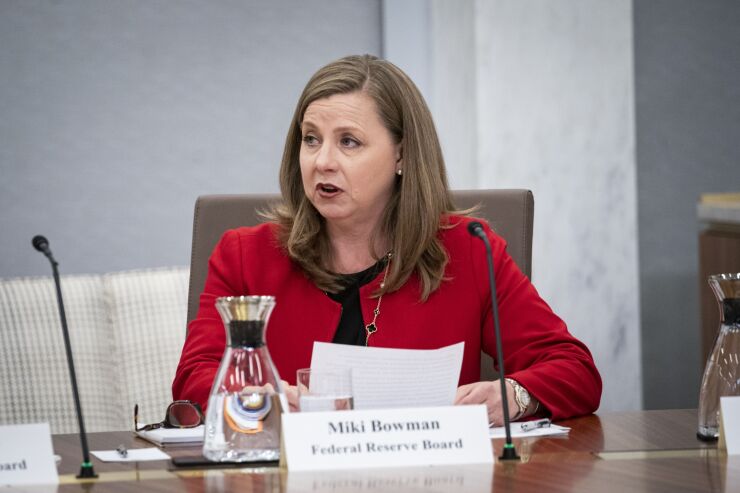
Federal Reserve Board Gov. Michelle Bowman is not concerned about the
In a speech at the Federal Reserve Bank of Kansas City on Tuesday, Bowman pushed back against the idea that federal regulators have become a "rubber stamp" for
"This is an expensive and reputationally risky process that bankers take extremely seriously," she said. "They do not make the decision to file an application lightly."
Aside from banks taking steps to ensure their mergers and acquisitions meet regulatory standards, Bowman said denials are further limited because banks often withdraw their proposals when it becomes clear that a combination is not viable. The Fed's most recent report on M&A activity notes that the agency approved 46 applications during the first half of 2023, while 12 were withdrawn.
"I have observed that applicants may withdraw a filing for a number of reasons, including prolonged uncertainty due to regulatory delays, expiration of contractual deadlines, and issues that are uncovered only during the processing of the application," she said. "For example, the issuance of updated supervisory ratings from recently completed examinations."
Bowman's comments come as the Fed, the Office of the Comptroller of the Currency and the Federal Deposit Insurance Corp. prepare to embark on a
Last month, the FDIC kicked off this effort in earnest by
During her remarks, Bowman raised several concerns about the FDIC's proposal, including its suggestion that the agency might issue statements about withdrawn applications in the interest of transparency.
"This approach could evolve to become the expectation for all withdrawn applications, and, if so, could put regulators in the untenable position of needing to disclose confidential supervisory information or nonpublic business information about applicants even in the case of a withdrawn application," she said.
Meanwhile, Bowman said, other elements of the FDIC's proposal would create less transparency around the M&A process. Specifically, she flagged the suggestion that deposit-based analyses might no longer be the basis of determining the competitive effects of a merger. Currently, a combined bank cannot exceed 30% of deposits in a single state or 10% of deposits nationally.
Instead, the proposal considers taking a more deal-by-deal approach to competitive analysis, one that considers "concentrations in any specific products or customer segments" — a shift meant to account for the impact of fintechs and other nonbank firms on market dynamics.
"I imagine bankers contemplating merger transactions will have little capacity to evaluate whether a merger would raise regulatory issues in advance under this open-ended standard," Bowman said.
She also voiced concerns about the FDIC's proposed use of commitments during the merger review process. The agency suggested using such covenants to ensure banks maintain retail banking footprints in certain areas for at least three years, and to guarantee that communities will be "better" served than they would be without a combination.
Bowman said conditions and commitments can be a useful tool during the merger review process, but warned against making a framework overly reliant on them.
"Conditions or commitments that impose obligations that are inconsistent with our existing regulatory framework raise issues of significant concern," she said. "In these circumstances, our existing rules and regulations are the most appropriate and effective tools to address concerns."
During her speech, Bowman
Bowman also warned that an overly restrictive merger review process could exacerbate this effect, by making it harder for banks to develop succession and exit plans. Combined with other regulatory changes being considered and implemented — including
"We currently have a dynamic banking system, but these individual pieces of the bank regulatory framework do not function independently," she said. "The policy choices embodied in current regulation and supervision, and in proposed reforms, aggregate to influence the future of the banking system, often in ways that are unpredictable, and at times in ways that are in conflict and internally inconsistent."






